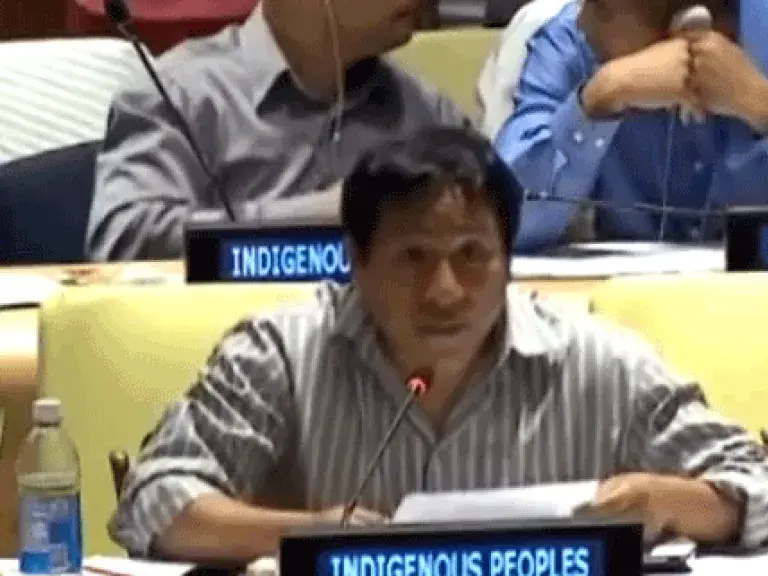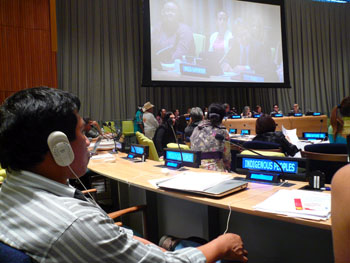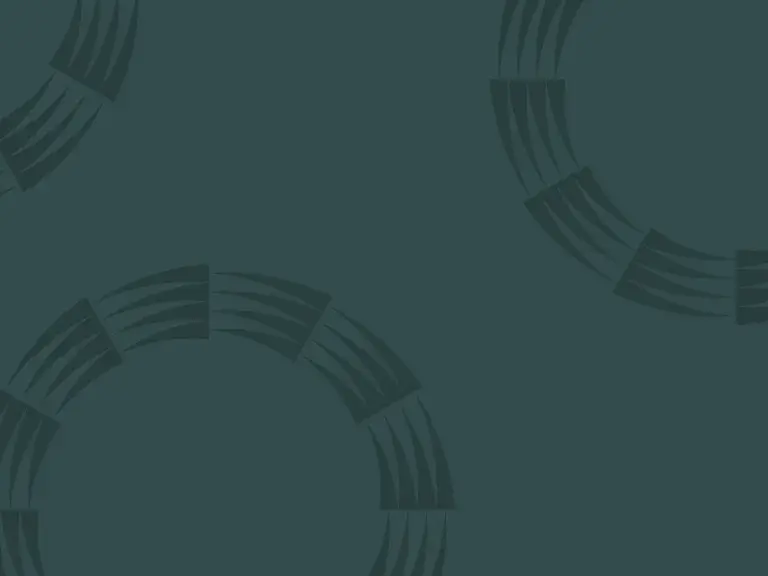
CLICK HERE for a printable PDF of this article![]()
 The United Nations Permanent Forum on Indigenous Issues held an unprecedented dialogue with the World Bank and regional development banks during its 12th Session May 20-31, 2013 at UN headquarters in New York City. The purpose of the session was to evaluate the degree to which these institutions respect the rights of indigenous peoples within their development activities, and to promote implementation of the UN Declaration on the Rights of Indigenous Peoples. While the activities and policies of development banks have often been discussed at the Permanent Forum, this was the first time a full plenary session was devoted to the topic, and the first time that the World Bank, the International Finance Corporation (IFC), and all three regional banks appeared before the UN body.
The United Nations Permanent Forum on Indigenous Issues held an unprecedented dialogue with the World Bank and regional development banks during its 12th Session May 20-31, 2013 at UN headquarters in New York City. The purpose of the session was to evaluate the degree to which these institutions respect the rights of indigenous peoples within their development activities, and to promote implementation of the UN Declaration on the Rights of Indigenous Peoples. While the activities and policies of development banks have often been discussed at the Permanent Forum, this was the first time a full plenary session was devoted to the topic, and the first time that the World Bank, the International Finance Corporation (IFC), and all three regional banks appeared before the UN body.
The Indian Law Resource Center, which was instrumental in advocating for the dialogue, was present during the session and contributed related comments and recommendations. The Center also joined with the Guatemalan organization Association for the Integral Development of the Victims of the Violence in Verapaces, Maya Achì (ADIVIMA) to bring attention to the struggle of Maya Achì indigenous communities devastated by one of the most harmful development projects in the Americas - the Chixoy Dam, financed by the World Bank and the Inter-American Development Bank.
Preventing Human Rights Abuses
During the Forum’s 12th Session, the Center worked together with representatives of the more than 10,000 Maya Achì Indians displaced or injured during the construction of the Chixoy Hydroelectric Project in Guatemala to call for accountability. The Chixoy Dam case has become emblematic of the human toll of development projects enacted with disregard for the rights of indigenous peoples: To make way for the dam, Guatemalan security forces forcibly evicted communities, engaged in forced disappearances, rape, and extra-judicial killings, and conducted several massacres of communities in the project area.
In a statement to the Forum, Juan de Dios Garcia Xajil explained that the construction of the dam took place during Guatemala’s genocide against indigenous peoples in the 1970s and 80s. “The financing banks had knowledge of the atrocities that were being committed against communities who resisted leaving their lands, yet they continued authorizing more loans for the completion of the project,” stated Mr. Garcia Xajil. (video in Spanish) (video with English translation)
“The construction of the Dam affected more than 11,000 people and 33 communities – losing theirlands, homes, crops, and community organization, their sacred sites, and their natural resources,” explained Garcia Xajil. “Today these families live in inhumane conditions, in extreme poverty, while the Guatemalan authorities, the World Bank, and the Inter-American Development Bank turn a blind eye.”
Garcia Xajil explained that although the communities and the government negotiated a reparations plan, witnessed by both banks, today that plan remains unfulfilled.
ADIVIMA called on the banks to finance the reparations plan and urged the Permanent Forum to speak out publicly, “so that the State of Guatemala, the World Bank, and the Inter-American Development Bank are sanctioned, and so that these atrocities are not repeated in other communities.”
In Guatemala and globally, indigenous communities are increasingly targets of large-scale energy and infrastructure projects. This is why the Center is working to develop mechanisms and standards to hold development banks accountable for the human rights impacts of their activities and to ensure that development works for indigenous peoples, not against us.
Improving World Bank Policies
During the dialogue with the banks, the World Bank played a prominent role. The Bank is currently undertaking a review and update of its safeguard policies – social and environmental policies designed to ensure that development projects don’t harm local communities and the environment. Among the policies up for review is the Indigenous Peoples Policy – a policy designed to prevent harm to indigenous communities like those affected by the Chixoy Dam.
A study on the World Bank’s Indigenous Peoples Policy and lending practices, drafted by Forum member Eva Biaudet, found significant inconsistencies with the UN Declaration. Ms. Biaudet explained that on the issue of indigenous peoples’ rights, the Bank had fallen behind other institutions.
World Bank Senior Advisor on Indigenous Peoples and Ethnic Minorities, Luis Felipe Duchicela, praised the existing Indigenous Peoples Policy as progressive, highlighting the fact that the policy’s objective is to ensure “that the development process fully respects the dignity, human rights, economies, and cultures of indigenous peoples.” (watch video)
In response, Ms. Biaudet challenged the Bank’s treatment of indigenous peoples’ ownership rights to their lands and resources, noting that the Bank only recognizes indigenous peoples’ land rights in specific circumstances, and even then there are wide gaps in implementation.
“I would like to reiterate and to highlight the need for the [World] Bank and all the banks to fully recognize, and of course also act upon, the fact that land is central to the survival and well being of indigenous peoples,” noted Biaudet, “and that indigenous peoples are particularly vulnerable and at risk for becoming forcibly evicted from their lands in operations which receive support from the Bank.”
While acknowledging challenges, Duchicela argued that implementation is a joint effort between the Bank, borrower countries, and project beneficiaries. Duchicela detailed the Bank’s plans for engaging indigenous peoples in a dialogue to address some of these concerns, through dedicated consultations and the establishment of an Indigenous Peoples Advisory Council. He stated that the Bank’s safeguards review process would involve an analysis of how the UN Declaration, or UNDRIP, affects the current policy.
“Part of the process will be to update it, and make it, of course, consistent, or more consistent, with the UNDRIP,” explained Duchicela. He additionally stated that while the review process is underway, the Bank will continue to improve implementation of the existing policy.
A Rights-based Approach
While Forum members were encouraged by the plans for updating relevant policies, they stressed that the proof would be in the specific language of the new policies. “The updated Indigenous Peoples Policy needs to use language that is consistent with the Declaration,” stressed Biaudet. (watch)
In a statement filed with the Forum, the Center argued that the World Bank, regional banks, and agencies implementing forest conservation projects, such as Reducing Emissions through Deforestation and Forest Degradation (REDD) must respect human rights.
“We believe these institutions have yet to understand the true collective nature and content of the rights of indigenous peoples as peoples,” said Center Attorney Gretchen Gordon. “The World Bank’s Indigenous Peoples Policy, for example, does not recognize the right of self-determination and does not fully protect indigenous peoples’ collective ownership of their lands and resources.”
The Center’s statement highlighted the fact that World Bank and REDD policies fall below the standards of the UN Declaration. “The Bank’s REDD agency, the Forest Carbon Partnership Facility, believes these safeguards sufficiently respect the rights of indigenous peoples,” stated Gordon. “We disagree.”
State representatives also urged the banks to reform their policies. “Denmark strongly urges the World Bank to bring the standards in the Indigenous Peoples’ Policy in full consistency with the UNDRIP, and thus to follow other multilateral development banks and the IFC,” said Elsebeth Tarp, Senior Advisor with the Danish Ministry of Foreign Affairs. “We attach, in particular, great importance to the recommendation on the need for the World Bank to adopt … the standard of free, prior and informed consent, and in general to institutionalize and operationalize a human rights agenda." (read statement) (watch video)
The Time for Action and a New Direction
Throughout the discussions, Forum members and indigenous peoples’ representatives expressed frustration with the failure of the World Bank to act on longstanding criticisms and recommendations made by indigenous peoples. “During the sessions of the Forum, we see the presence of the Bank in various ways, but substantive progress doesn’t seem to have taken place with regard to actually reforming the policy,” said Forum Member, Raja Devasish Roy. “The apprehensions and the concern are quite reasonable - it has really taken much too long.”
Forum Member Chief Edward John expressed similar frustration. “Many of the recommendations that have been coming forward, have been brought…to the World Bank and others at least since the 1980s.” stated Chief John. “It’s time to move on to the next level and work with indigenous peoples to incorporate the standards in the Declaration.” (watch video)
Ms. Biaudet stressed that while the safeguard policies are designed to help ensure that projects “do no harm” to local communities and their environments, they should do more to actually assist institutions to “do good” such as “promoting sustainable development and encouraging policies and legal reforms to enhance local livelihoods and assist indigenous peoples to realize their rights.”
The need for effective oversight mechanisms to ensure compliance with whatever new safeguards are established was another important theme of the dialogue.
The Center in its statement stressed that with the safeguards review and REDD policies currently under development, “now is the time to shape the direction of these institutions.” During the session, Center Washington Office Director Armstrong Wiggins urged indigenous peoples not to settle for shortcuts or vague policies that aren’t binding, or that don’t address indigenous peoples’ collective rights of self-determination and ownership of lands, territories, environments and resources.
“What you’re hearing today from the UN Permanent Forum is what indigenous peoples have been saying around the world,” said Wiggins. “Indigenous peoples are not against sustainable development, but we are under constant threat of having our lands taken or destroyed in the name of development,” he stated, “due to the fact that much of the remaining forests and natural resources left in the world are found in our territories. If development banks are not held accountable for their impacts on the human rights of indigenous peoples, atrocities like the Chixoy Dam will continue to play out in our communities.”
In its final report, the Forum issued strong recommendations to the banks, including demanding that the World Bank bring its Indigenous Peoples Policy into full compliance with the UN Declaration, and institutionalize a human rights-based approach. The Forum urged the Bank to incorporate the right of indigenous peoples to free, prior and informed consent, without qualifications, and stated that the banks “should not support any projects that affect indigenous peoples without prior recognition of and effective guarantees for their collective rights to own, control and manage their lands, territories and resources.”
Finally, the Forum recommended that the Bank work with UN agencies and experts to produce a study on involuntary resettlement of indigenous peoples in connection with Bank-financed projects like the Chixoy Dam, and deliver its findings during the Forum’s 2014 Session.
For more information:
See the Indian Law Resource Center’s work at the Permanent Forum
Find more information on ADIVIMA and the Chixoy Hydroelectric Project
Read the Permanent Forum’s press release on the dialogue with the banks: “World Bank Pledges to ‘Listen with Heart and Soul’ to Indigenous Peoples: But Intergovernmental Organizations, Permanent Forum Members Skeptical”
Watch the video of the dialogue with the United Nations Special Rapporteur on the Rights of Indigenous Issues. Read the summary.
Watch the video of the day-long dialogue with the banks (morning and afternoon).
Read selected statements by participants.
Read the Permanent Forum’s final recommendations adopted in the Report on the 12th Session.
